|
Posted by Romy the Cat on
04-23-2009
|
|
fiogf49gjkf0d
Somebody "KCCT82" from Devil Audio site posted information about own installation.
Channels:
TAD ET-703 compression driver <12k-20k> (107db 8 ohms)
TAD TD-4002 compression driver on 400hz tractrix <1.9k-12k> (110db 16 ohms)
GOTO 505TT compression driver on GOTO 150hz hypex <250-1.9k> (110db 16 ohms)
TAD TL-1101H cone driver on DIY 1/2 space 53hz hypex with 5" throat <58-250> (around 103db if not more... 16 ohms)
TAD TL-1603 cone driver on DIY tapped horn <20-58> (around 95db... 8 ohms)
All channels are active, crossovered and EQed by Behringer DCX 2496 and powered by 5x100W SS PP pro audio power amps.
I am posting some images of the setup. With all mistakes made in this installation some of the moves made in there are pretty good - I like the upperbass horn with 5" throat and 58Hz mouth. It is unquestionably that in this configuration there is no need to talk about Sound. Still, there is the point in this installation - the use the tapped horns between 20-58Hz, that I would like to accent.
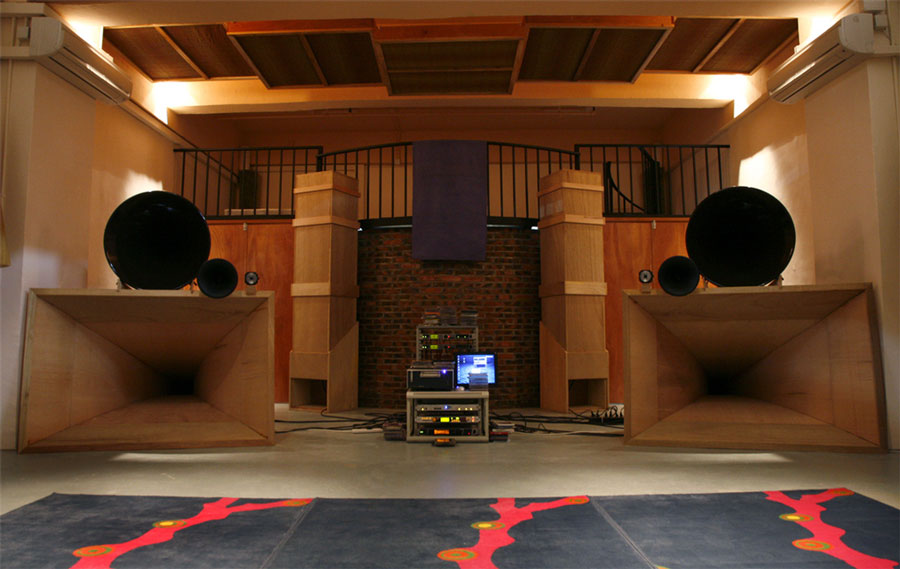
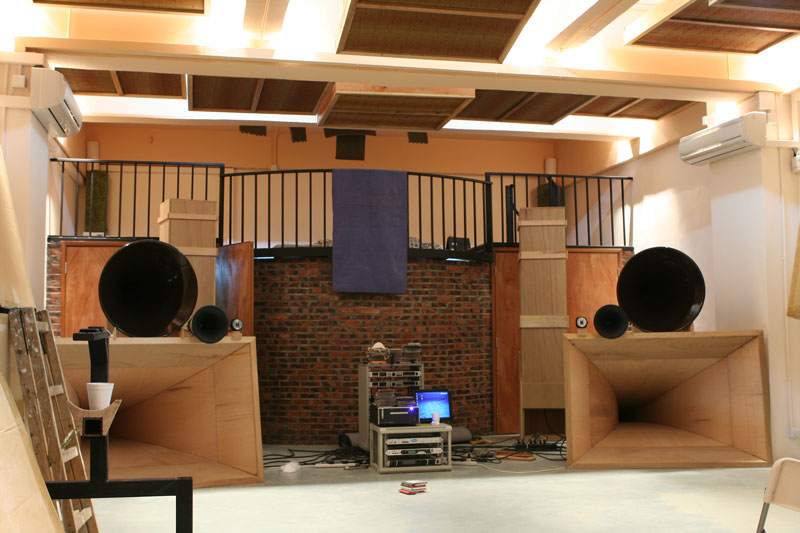
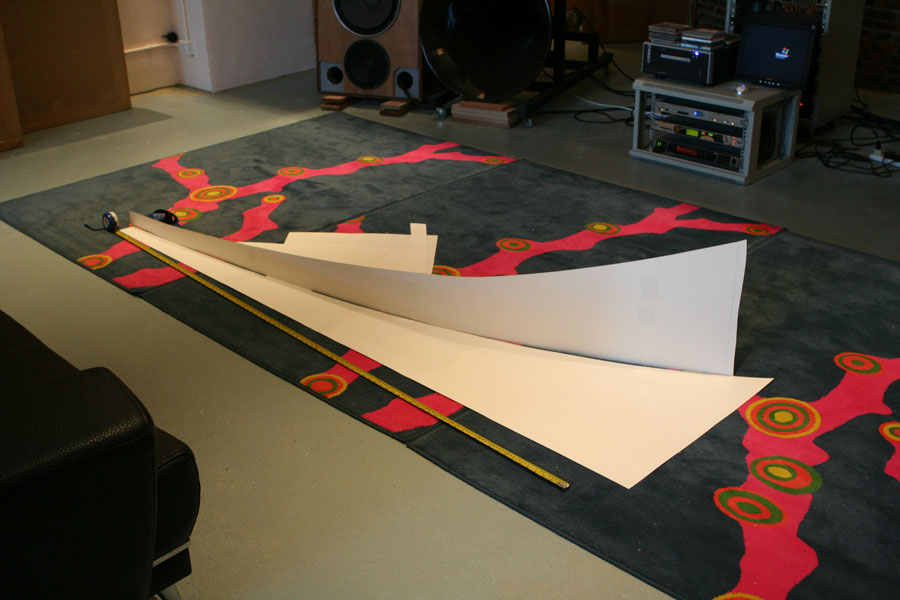
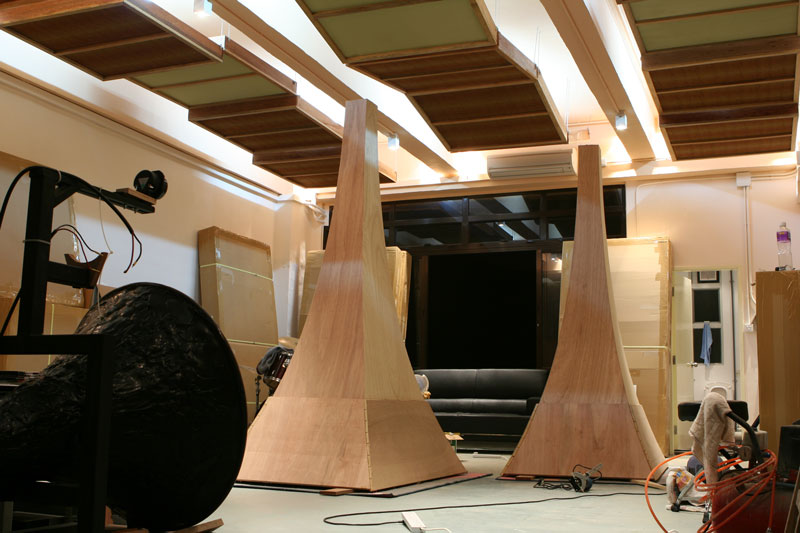
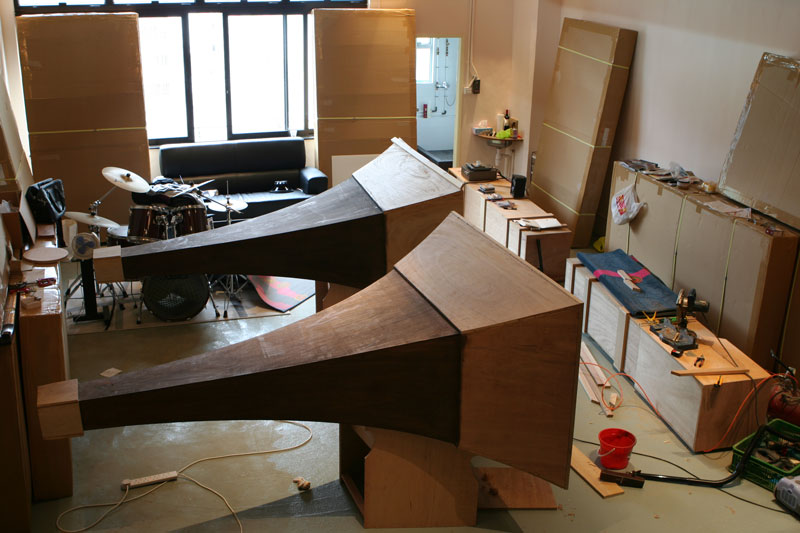
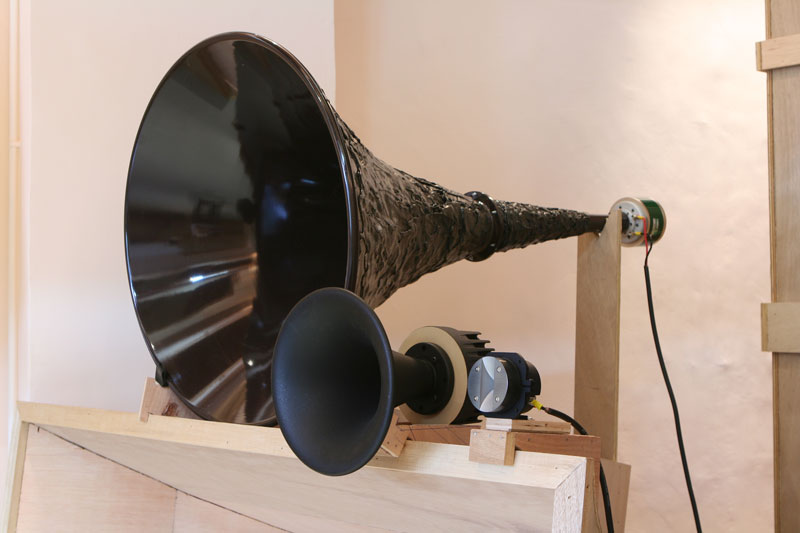
John Hasquin told me about his 20Hz tapped horns very positively. I do not know… as the idea of the series resonant chambers is not to my liking. Still, I never heard an offensively-made tapped horns and I have no idea what kind sound people get from it. Sure, the notion to get 20Hz from 2 feet by 2 feet of footprint sounds so sexy. How that tapped bass sounds and can this horn to play properly “soft” bass is the bigger question. The Cat
|
|
|
|
Posted by ferenc on
04-26-2009
|
|
fiogf49gjkf0d Hi Romy,
You should have to check Tom Danley's speakers at http://www.danleysoundlabs.com/. He has quite a few tapped horn subs and Synergy horns for PA, but there are people using his speakers at home, like
myself. I have changed from Avantgarde Acostics Trio horn speaker to his SH 50 then to SH 100Bs, but I use his SH 100 and SH LPM for different PA and Home Theatre projects.
ferenc
|
|
|
|
|
|
|
Posted by Romy the Cat on
04-27-2009
|
|
fiogf49gjkf0d
 tuga wrote: tuga wrote: | |
Yes, Tuga, I realized the he was here. The tapped horns and the midbass horn was an interesting move but the use of digital crossovering option and SS PP amplification of course set all bets off and make the installation boring to even to think about.
 ferenc wrote: ferenc wrote: |
You should have to check Tom Danley's speakers at http://www.danleysoundlabs.com/. He has quite a few tapped horn subs and Synergy horns for PA, but there are people using his speakers at home, like myself. I have changed from Avantgarde Acostics Trio horn speaker to his SH 50 then to SH 100Bs, but I use his SH 100 and SH LPM for different PA and Home Theatre projects. |
|
Thanks, ferenc. I know that Tom Danley is out there with his horns but I never looked what he does. The Avantgarde Acoustics Trio bass sections of cause were good for nothing. No wonder that you like any alternative option. The Danley’s site has a paper about tapped horns, I read about it but I generally do not get a lot of useful information from “white papers”.
http://www.danleysoundlabs.com/pdf/danley_tapped.pdf
The same was here, I disagree with some of the Danley’s statement and I found that some of his comments are just irrelevant from the perspective of how Sound is made. Still, I did not hear the Danley’s tapped horns and I have no idea what he is trying to do.
Anyhow, Tom Danley looks like has an interesting small footprint horn that is similar to what KCCT82 uses.
http://www.danleysoundlabs.com/pdf/DTS%2020%20Spec%20Sheet.PDF
Again, I am bit defensive about some of the horn characteristics and what I read between the lines but who knows, if I heard it in context of a rational installation then I would be able to say something definitive. I generally, as you might read before, am against the “open bottom” horns and consider them as a topological mistake. Would the Tom Danley’s trapped horn be an evidence of it or will it be able to battle my reasoning? I do not know. The trapped horn idea, from what I can see, has all justification to become a quarter-ass solution or the solution for the people who hear via SPL and “white papers” but, despite me do having some negative premonitions, I would hold my final judgment. The Cat
|
|
|
|
Posted by serenechaos on
04-28-2009
|
|
fiogf49gjkf0d I built a pair of tapped horns, as per John Hasquin, designed to integrate w/ mid-bass horns (cross over ~ 70-80 hz).
Loaded in the corners, the low bass is well supported, and, they "dissapear" sonicaly.
By that, I mean, they don't "stick out" at all, I don't notice them unless I unplug them.
The term "soft bass" comes to mind, and very much applies, if we are thinking the same thing.
|
|
|
|
Posted by Kcct82 on
04-29-2009
|
|
fiogf49gjkf0d Hello Romy,
The tapped horns were easy to construct so I made them while I was working on the midbass channel. I can't really comment on how good tapped horns are because I have never heard other 20-35hz capable systems... it does provide amazing SPL's and to my dad and I, the sound is good. I do not understand what you mean by "soft" bass but like Serenechaos have said, it does not "stick out".
There's another thing perhaps due to tapped horn positioning, my previous -10db at 40hz, +11db at 51hz, and -10db at 60hz are now much less severe.
Honestly the tapped horns are the least of my problems right now... like you have pointed out, the electronics is a mess, placement for the 3 upper horns is another issue, crossover points and tractrix horn building...
Best Regards,
Keith
|
|
|
|
Posted by tuga on
04-29-2009
|
|
fiogf49gjkf0d  serenechaos wrote: serenechaos wrote: | I built a pair of tapped horns, as per John Hasquin, designed to integrate w/ mid-bass horns (cross over ~ 70-80 hz).
Loaded in the corners, the low bass is well supported, and, they "dissapear" sonicaly.
By that, I mean, they don't "stick out" at all, I don't notice them unless I unplug them.
The term "soft bass" comes to mind, and very much applies, if we are thinking the same thing.
|
|
Hello serenechaos,
I'm curious about the configuration your Hasquin's tapped horns.Would it be possible for you to upload a photo?How about sound? Bowed double bass is hard to reproduce and I guess it should definitely not sound "percussive"...
Cheers,Tuga
|
|
|
|
Posted by Romy the Cat on
04-29-2009
|
|
fiogf49gjkf0d
It sucks – whoever builds horns too damn far! I need to see my congressmen to lobby lowering taxes for horn users of something like this….
Anyhow, the “erenechaos” comments about the “soft bass" is a good sign, though of course to equalize the coordinate systems of judgments is possible only sitting in the same room, listening the same installation and compare the notes…
With all of my negative predisposition in regards to the curved re-entry horns (that the tapped horns are basically are) I have to admit that it is not my major concern about the tapped horns. My major concern is that the tapped horn is close- bottom horn and it is something that I very much do not like and why I generally extend my support to midbass horn but denounce the lower bass horns and conceptually faulty devices. The tapped horns are essentially the same – the “close bottom” horns – I do not like the idea, at least on paper.
The problem with rectification of the conteversy about the importance of “open bottomless” ironically lays in the attitude of many audio people as they in majority are very close-minded and so obsessed with own accomplishments that refuse to engage or even to recognize realty of accomplished. It is no surprise that the worst lower bass I heard was from the installations where people invested a lot of efforts to build that lower bass via bass horns. Anyhow, if is known that I am not a big supporter of the lower bass horn solution.
What I say is not directly applicable to tapped horns, even despite they are “closed bottom” solution as well. Perhaps something in them the cancels out the negative effect of “closed bottomness” – I do not know – I need to hear the thing to say anything more defiantly.
I remember a few years back John Hasquin posted a lot of information at TriodeMafia web site about his carnal relations with tapped horns. I was banned from TriodeMafia because I expressed my strong desire for one of their assholes (Ed Sawyer) a soon and very painful death. I hope that this paces of human waste is already dead and the TriodeMafia might invite me back, if not then I wish that Ed Sawyer would dies very slow and agonizing with great suffering to anyone who knows him (I am not kidding) - he and anyone who associated with him are well deserve it. Anyhow, John at that time send a lot of information about his view and his progress on tapped horns, I need to found it somewhere and to reread.
Keith, is your tapped horn also John Hasquin ‘s implementation? Serenechaos, what do you use above 10kH, what is your midbass solution and how you crossover your tapped horn? Also, what is the dimension of the thing? Furthmore, are of you guys who use the tapped horns looked the different versions of the tapped horn, let say Hasquin ‘s and Tom Danley's tapped horns? Rgs, Romy the Cat
|
|
|
|
Posted by serenechaos on
04-29-2009
|
|
fiogf49gjkf0d I do not know what is meant by “close bottom” or “open bottomless”-- please expound?
I do not know of importance of enemys death to this topic.
There is a long thread in the subwoofer section of "devil audio" about tapped horns.
John mentioned getting a flatter response than I was able to using the same driver (4012HO definemax) I was working with.
I wrote, asking for advise, he suggested adding a inductor in series w/ the driver.
Also cutting the throat the full size of the driver, not smaller for compression ratio (!!!)
He has built others since, is now using two drivers per cab; and says it works better.
I looked @ many designs, spent a while studying Danley's & the patent trying to figure out what was going on with it, and the resonators, etc.
Size of the THs I built is ~ 16" x 16" x 80".
implementation--ok, here we go; now none of what I said means anything...
different room, different system...
mine is all "unfinished/evaluating/work in progress;" experiments--listen, change, listen, repeat at this point...
only the tapped horns, and "what I use above 10kHz" stays.
passive line leval crossover, seperate amps.
This is all building towards:
the tapped horn is to ~70Hz.
a mid-bass horn from ~70 - ~500Hz.
a low-mid horn from ~ 500 - 1kHz. (what you call fundamental channel)
a high-mid horn from ~1kHz - 10kHz.
a ribbon from 10kHz up.
|
|
|
|
Posted by Romy the Cat on
04-29-2009
|
|
fiogf49gjkf0d
 serenechaos wrote: serenechaos wrote: | | I do not know of importance of enemys death to this topic. |
|
Oh, this is a sheer pleasure but do not call that dirt enemy. He is not enemy but way beyond it, he is the person about whom I have a death-wish as pure self-pleasuring. Think about him like people thought about Hitler and think how pleased some people would be learning that that son of bitch choked to death. Enemy implies a conflict of interests. He is no enemy, in fact I have no idea who he is and what his interest are. However, knowing his actions I sincerely feel that he is out of presentences of any civilized treatment and that he shall be literally exterminated like some kind of virus or very filthy bacteria.
 serenechaos wrote: serenechaos wrote: | | I do not know what is meant by “close bottom” or “open bottomless”-- please expound? |
|
I have expressed those views of mine many times and this is one of my major reasons why I am not so excited about use of bass horns for the lowest channel of playback. In the past I wrote in the “Barn Conversion - James' Project” thered:
"The sealed enclosure I call “opened bottom” enclosures. What I mean is that there are no conceptual limitations in lower response. The limitations in sealed box are tactical: how much power you have, how much your drivers will handle, what is the relation of volume and Fs, how driver damped by amplifier and many others. However, there is no self-restricting boundary in there. With any other LF solutions (horn, open baffles, 4th order, ported and so on) there are always strategic limitations by nature of the design… would it be size of the baffle, size of the mouth or tuning of a port). With sealed box you can always burn some power, use the LF section on transition slope or even EQ (with open bottom only) your bass (works very well). With any other solutions (besides sealed box) those “further actions” are not available. Those are some of my motivations why I do not like the idea of bass horns and prefer the sealed enclosures"
Take a look what happed with any bass horn. In order to get proper sound out of any bass horn you must unload the lowest frequency from the horn, the frequency that are not able to be reproduced by this horn. This is a very big subject and I can talk for very long nowadays about the ways how the rule might be “banded”, but unloading of unused bass is very basic objective. BTW, the person who made me to think about it was John Hasquin. That sharp explicit filtration of bottom knee of a channel is fine if you have another channel follow but if it is the last channel then it not good. Pretend that you have a tweeter with low pass filter. Did you ever try to use any anti-rambling filters in phonostages, those the kill under 20Hz of what they call TT noise and record warp noise? Di you see how it killed everything? So, those systems I call “closed bottom” and there is a sharp and definitive roll of at LF. Take a look what Tom Danley says in his tapped horn: 15 Hz with 24dB/octave of high-pass. You see it is the lowest channel in system and you have 4th order high-pass. I do not like this idea and I would like the lowest channel to have not explicitly restricted LF response, or something that I call “open bottom”.
 serenechaos wrote: serenechaos wrote: | There is a long thread in the subwoofer section of "devil audio" about tapped horns. John mentioned getting a flatter response than I was able to using the same driver (4012HO definemax) I was working with. I wrote, asking for advise, he suggested adding a inductor in series w/ the driver.
Also cutting the throat the full size of the driver, not smaller for compression ratio (!!!)
He has built others since, is now using two drivers per cab; and says it works better.
I looked @ many designs, spent a while studying Danley's & the patent trying to figure out what was going on with it, and the resonators, etc. |
|
Sure it is all very interesting but to have in an idea about what people are taking about discussing the quality of tapped horns it would be nice to hear one…
 serenechaos wrote: serenechaos wrote: | | Size of the THs I built is ~ 16" x 16" x 80". |
|
…and THIS is the deal-breaker….
 serenechaos wrote: serenechaos wrote: | implementation--ok, here we go; now none of what I said means anything...
different room, different system...
mine is all "unfinished/evaluating/work in progress;" experiments--listen, change, listen, repeat at this point...
only the tapped horns, and "what I use above 10kHz" stays.
passive line leval crossover, seperate amps.
This is all building towards:
the tapped horn is to ~70Hz.
a mid-bass horn from ~70 - ~500Hz.
a low-mid horn from ~ 500 - 1kHz. (what you call fundamental channel)
a high-mid horn from ~1kHz - 10kHz.
a ribbon from 10kHz up. |
|
Very, lucid system!
So, you have a tapped horns at 70Hz and below. Does it mean that you do not use any high-pass filtration with your tapped horn? You said that you use passive line level crossover and separate amps. So, what is the bottom frequency response of the power amps that drive the tapped horn? Do those amps have any topological restriction of LF that might act at high-filter for you tapped horn? Rgs, Romy
|
|
|
|
Posted by serenechaos on
04-29-2009
|
|
fiogf49gjkf0d
ahh yes, tapped horn is what you would call "close bottom." It has to be designed around frequency response (which is very narrow band). It isn't a problem getting one to go low enough though, and the quality of sub bass produced, smooth yet dynamic, present not overbearing, and volume per footprint per watt input was much greater than the sealed boxes it replaced.
No, I do not use any high-pass filtration, or feel any need to. They have a steep enough acoustic roll-off, that i'm not at all worried about hurting the drivers @ the levels I play them at. If I were using them for PAs, or stadiums, (as Danley customers usually do), then I'd be concerned about it.
Same with thermal overload, and x-max, that devil audio guys worry about. But they're using 1000 watt amps, and trying to see how much spl they can put out...
I'm still in a "less is more" as far as adding electronics to the signal path.
Again, like those anti-rumble filters in phonostages you mentioned, that kill everything, not just under 20Hz...
Robert
|
|
|
|
Posted by Romy the Cat on
04-29-2009
|
|
fiogf49gjkf0d I think it might be very interesting to introduce the high-pass filtration for tapped horn and to see how it behaves. It is not only about thermal overload and restriction of excursion. The unloading of none-used bass generally clean-up the transparency of band-bass very positively. The benefits might wary with the drivers and the way in which the driver is damped. You might want to try it, get a cheap digital crossover and try different slopes between 10Hz and 20Hz. You would not need to listen the absolute quality but rather the pattern in which Sound night be changing. If you found that let say at 14Hz you would like to roll of your tapped horn with second Bessel order then you would always be able to implement it in your tapped horn’s bass amp.
The Cat
|
|
|
|
Posted by Kcct82 on
04-30-2009
|
|
fiogf49gjkf0d Hello Romy,
I didn't use John Hasquin's tapped horn design, I modeled my own in hornresp for my TAD woofer. I knew I would only need it up to ~55Hz so I was happy to have it flat from 23Hz-70Hz.
The lowest crossover point for Behringer DCX 2496 is 20Hz, I can try it either with or without a filter at 20Hz.
Best Regards,
Keith
|
|
|
|
Posted by decoud on
04-30-2009
|
|
fiogf49gjkf0d Romy, I know you despise DIY, but isn't this so obscenely simple to build one may as well try it? Presumably, all one needs is a length of large diameter cylindrical pipe, with a partition running down the middle? If one uses two pipes of slightly different diameter, with sand poured between them, even the material the pipes are made of would not matter, no?
|
|
|
|
Posted by Romy the Cat on
04-30-2009
|
|
fiogf49gjkf0d  Kcct82 wrote: Kcct82 wrote: |
I didn't use John Hasquin's tapped horn design, I modeled my own in hornresp for my TAD woofer. I knew I would only need it up to ~55Hz so I was happy to have it flat from 23Hz-70Hz.
The lowest crossover point for Behringer DCX 2496 is 20Hz, I can try it either with or without a filter at 20Hz.
|
|
Keith, this experiment must NOT be done blindly as it will absolutely defeat the purpose if it done methodology incorrect. You will have the “change” in sound but you will not know if this change was due to the high-pass filter truncated response itself or because it unloaded the unused bass. You need to run very high resolution of RTA at the bottom knee of your tapped horn and to see if your high-pass does not cut the tail of the natural response. Theoretically the filter must kick in right after then but who knows what happenes in the case of the tapped horn…
 decoud wrote: decoud wrote: | | Romy, I know you despise DIY, but isn't this so obscenely simple to build one may as well try it? Presumably, all one needs is a length of large diameter cylindrical pipe, with a partition running down the middle? If one uses two pipes of slightly different diameter, with sand poured between them, even the material the pipes are made of would not matter, no? |
|
Oh, No! It is very much not on my horizons. If I do it then I certainly would not do it myself but commission right people to do the job and manage the project but to do it I would need some reasoning: theoretical or empirical. Empirically I have no data as I never heard properly made tapped horns. I do not have problem with my bass and I never had any of my visitors pointed out in my bass the specific shortcomings that they feel need to be addressed. It is not that I do not recognize in my current bass specific idiosyncrasies that I would like to be doe different but I have no evidences that tapped horn or even conventional bass horn would address them. Theoretically I as well see justifications why tapped horn would be a more advance option. This is why I am asking what is going on with tapped horns…
The Cat
|
|
|
|
Posted by serenechaos on
04-30-2009
|
|
fiogf49gjkf0d  Romy the Cat wrote: Romy the Cat wrote: | I think it might be very interesting to introduce the high-pass filtration for tapped horn and to see how it behaves. It is not only about thermal overload and restriction of excursion. The unloading of none-used bass generally clean-up the transparency of band-bass very positively. The benefits might wary with the drivers and the way in which the driver is damped. You might want to try it, get a cheap digital crossover and try different slopes between 10Hz and 20Hz. You would not need to listen the absolute quality but rather the pattern in which Sound night be changing. If you found that let say at 14Hz you would like to roll of your tapped horn with second Bessel order then you would always be able to implement it in your tapped horn’s bass amp.
The Cat |
|
blah, blah, blah, all that stuff...
yes, yes, I was thinking along those lines last night after I posted it, and wondering if effects of hi pass, (not just steep acoustic roll off of driver), in the amp, relieving unwanted signal getting to the drivers might be a good thing. Building band-pass filters, into the amp actually.
I thought at least that channel was done.
Damn Cat!
Ok, digital experiments, then call Dave Slagle, get good iron & filter parts if it helps.
robert
|
|
|
|
Posted by Romy the Cat on
04-30-2009
|
|
fiogf49gjkf0d
 serenechaos wrote: serenechaos wrote: |
blah, blah, blah, all that stuff...
yes, yes, I was thinking along those lines last night after I posted it, and wondering if effects of hi pass, (not just steep acoustic roll off of driver), in the amp, relieving unwanted signal getting to the drivers might be a good thing. Building band-pass filters, into the amp actually.
I thought at least that channel was done.
Damn Cat!
Ok, digital experiments, then call Dave Slagle, get good iron & filter parts if it helps.
|
|
Obviously when in amp filtration is THE filtration but…
1) You do not know if it is necessary
2) You do not know what is necessary (cut off and slop)
3) If it is high order then you do not know if the topology of your amp would candle it
4) You do not know if you need to use RL filtration.
The last one is the tricky one. The series capacitance is bad but if you channel does just LF, let say below a few hundred Hertz then, the negative contribution of series capacitance is kind of questionable…
The Cat
|
|
|
|
Posted by serenechaos on
04-30-2009
|
|
fiogf49gjkf0d
on 1) & 2); by "digital experiments" I meant "get a cheap digital crossover and try different slopes;
on 3) & 4): Dave Slagle, Intact Audio, knows a LOT more about transformers than I do, and the nickle autoformers I got from him work so well, I totally trust his (and/or Jeffrey Jackson's) judgment to over my "guess work," etc. I don't trust myself to do everything from scratch, need to/eaisier to commission some things to someone else.
robert
|
|
|
|
Posted by Romy the Cat on
04-30-2009
|
|
fiogf49gjkf0d
 serenechaos wrote: serenechaos wrote: |
on 3) & 4): Dave Slagle, Intact Audio, knows a LOT more about transformers than I do, and the nickle autoformers I got from him work so well, I totally trust his (and/or Jeffrey Jackson's) judgment to over my "guess work," etc. I don't trust myself to do everything from scratch, need to/eaisier to commission some things to someone else. |
|
If you drive your LF section with SET amplifier with a transformer or use Innerstage transformer then use transformers to roll off LF and introduction of high-pass via transformers is not a good idea. You would need an explicit filter. Transformers when they roll off distort a lot and they would roll of with dependency with the strength of the signal - you might not want it. The problem with the bass nigh-pass is that it might demand high order and it might be hard to do in a simple SET as most of SETs use very simple circuit and there is not a lot of space (design-vise) where filters or 2-4 order might be implemented. The trapped horns are looks like not overly sensitive to begin with, so you most like use higher power and higher gain amps. Anyhow, the key is to found out if the trapped horn in your implementation and with your driver need a roll off then you might see where to put the filters. Do not forget that second order nigh-pass on speaker lever would mean CL chain that would not affect damping and therefore it might be tried in there… Theoretically to unload the unused lowers bass it would be nice for bass amps as well but it you have SET in Class A with sufficient amount of spare inductance then it would not mater….
The Cat
|
|
|
|
Posted by serenechaos on
04-30-2009
|
|
fiogf49gjkf0d Yes, tapped horns are lower efficiency, mine are 105 dB (not 108 - 110 dB like the rest of the system).
I don't even KNOW that SET or Class A is automatically appropriate for tapped horns...
Something like op amp driven PP in class AB might even work better, for all I know...
But if I do conclude the need for a hi-pass filter, I'll definitely need to talk to someone who knows more about such things than I do...
But thanks for pointing out possible merit of high pass, and possible problems in implementation!
Robert
|
|